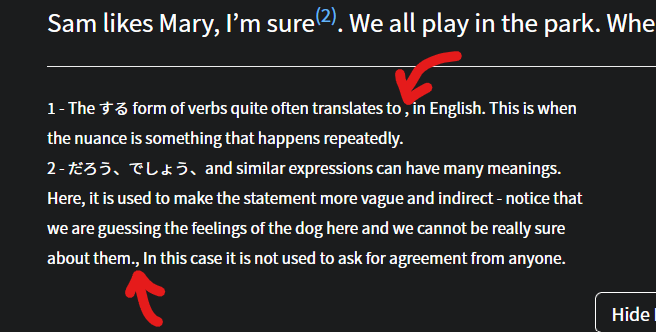This is a discussion topic for the N5 Lesson 3 reading passages.
Does anyone really call their dog John ?

Yeah, clearly the only valid dog name should be タクシー !
I think it’s missing する after 散歩を《犬と散歩をする時について話しています。》
@Jake The above comment from @Astroraptor , plus in the picture below…
– missing word
– extra comma

Also Mary… then again I called my cats Laura and Elena… named after the friends I had when I was 5…
I have a question about the second story and how it translates.
サムと帰る。サムは水を飲む。
translates to :
When we go home, Sam drinks water.
I’m a little confused because the Japanese version is two separate sentences, where the English translation puts the two sentences together. Is it common to merge sentences together like this, or was the Japanese simplified to use basic grammar?
yes
I’m seeing について a lot in the N5 reading for it being an N3 grammar point.
Just yesterday when observing Genki 1 (textbook) class, について was used in the と思います grammar point. Page 200’s Practice section, to be exact.
It’s a good thing that one could choose to add their own grammar point in Bunpro in whichever order.
Hi there! I’m quite a beginner when it comes to Japanese grammar, and I’m trying to self-study, so any clarification on the following would be much appreciated!~
「好きなんでしょう。」
-
んでしょう - Is this the grammar point of ~んです being adapted to ~でしょう?
-
好きな - I know 好き can act as a な-adjective, thus sometimes adopting ~な at the end, but I thought that’s only the case when it has a noun after it, is there an exception here?
Hey there, I’m not a pro myself but I think I can answer for your second question - 好きな isn’t “sometimes acting” as a な-adjective, it is 100% of the time a な-adjective. You don’t see the な in the usual construction “… が好きです” since it is not before a noun, as you stated.
But the explanatory structure " んです" has its own rule when it comes to な-adjectives :
[な]Adjective + な + ん (1) + だ
Hope that helped !
This makes a lot of sense! Thank you for your help!
